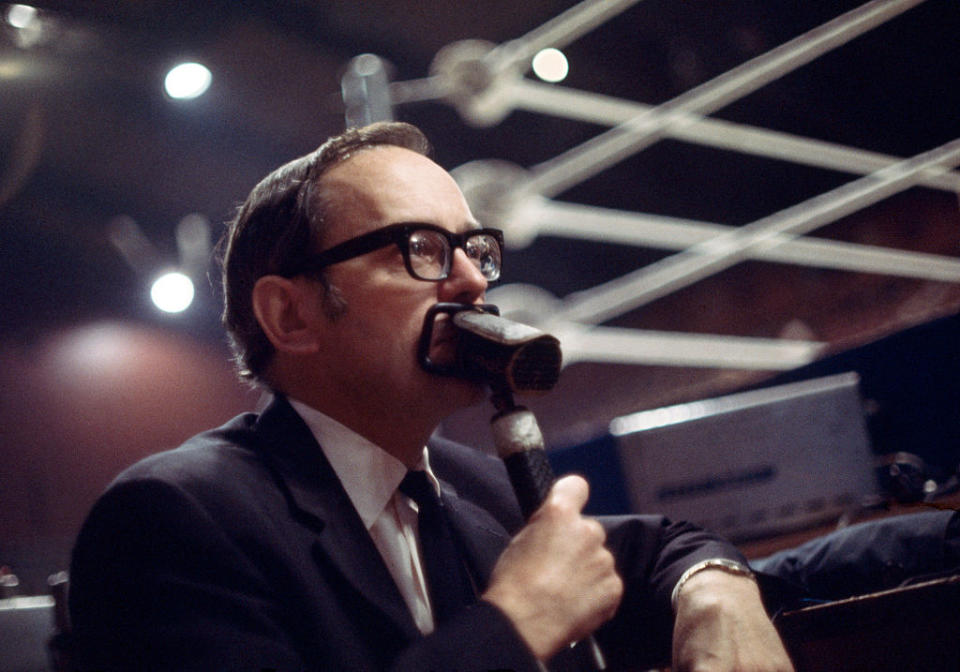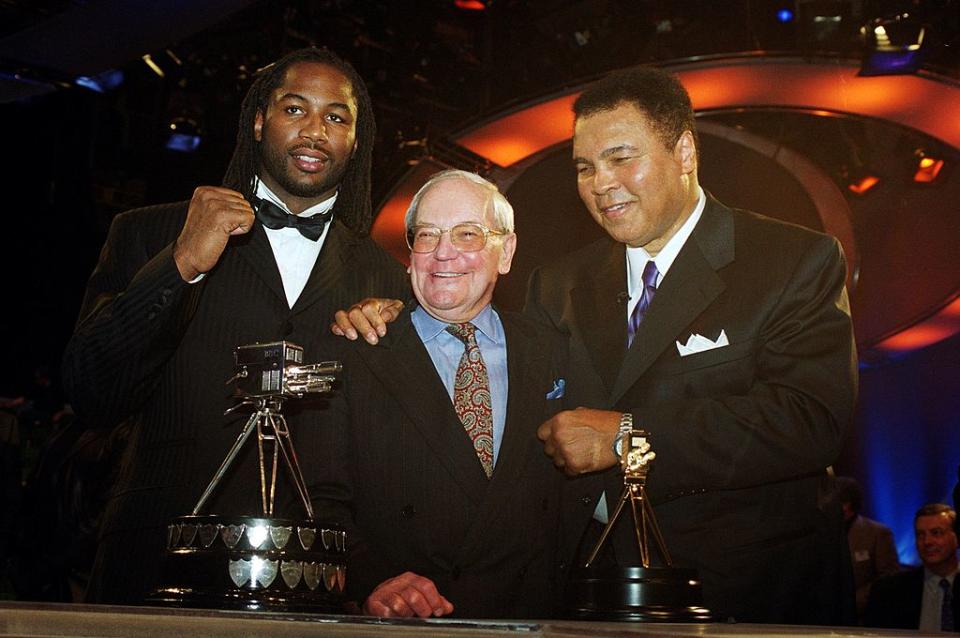Voices of Sport: Harry Carpenter - The brilliant boxing commentator that had a special relationship with Frank Bruno
In our weekly series, Yahoo Sport’s Nick Metcalfe features a famous voice of sport. The great BBC boxing commentator Harry Carpenter is the latest to go under the spotlight.

Harry Carpenter is one of those special broadcasters that those of a certain age will always remember. If you loved watching sport, you definitely shared a good deal of it with him.
Mainly it was boxing, with Carpenter brilliantly describing big fights on BBC television for decades. But there was so much more besides. Grandstand at weekends. Sportsnight in midweek. Wimbledon and The Open in high summer. Sports Personality at Christmas. He was in our living rooms all year long.
We knew where we were with Carpenter. There was authority of course, bundles of it. Gravitas too. Great knowledge was a given. Plus a wealth of experience as the years went on. We respected him enormously. And we still miss him.
Like many broadcasters Carpenter started in print journalism, working as a sub-editor for several national newspapers. He joined the BBC in 1949, and for a time combined broadcasting and writing. He penned a boxing column for the Sporting Record, and later reported on the sport for the Daily Mail.
But it was behind the microphone where Carpenter was happiest. And he quickly made a name for himself as a key part of the BBC team. He became a regular at the Olympics, working on every Games from Melbourne in 1956 to Barcelona in 1992.
He also presented a number of the BBC’s most famous programmes. There was the show that became a fixture for sports fans on a Saturday afternoon for generations, Grandstand. And Sportsnight on a Wednesday night from 1975 to 1985, with its highlights of domestic and European football, and plenty of other treats besides.
For many years, Carpenter was the main face of those two treasured weeks at Wimbledon, and he also fronted BBC coverage of another special event, the Open Championship.
We didn’t mind that he sometimes had a problem with his vowels, we knew that Carpenter would guide us through those famous occasions with great aplomb. The below video clips show Carpenter presenting Wimbledon in 1981.
Despite his many other commitments, boxing was his true passion and great constant. From 1962 to 1994, Carpenter was essentially Mr Boxing on the BBC. If there was a big fight, it meant either Carpenter on one side or Reg Gutteridge on the other - I’ll be profiling ITV man Gutteridge, another broadcasting great, in this series later in the year.
The Carpenter decades at ringside coincided with some of the most compelling characters in sporting history. None more so than Muhammad Ali. The legendary American took the sport by storm, first when he won Olympic gold at the 1960 Rome Games and then as he began to take the heavyweight division by storm. The world was very quickly spellbound.
When Sonny Liston failed to leave his stool during a memorable heavweight title fight in Miami in 1964, Ali - then Cassius Clay - became king of the boxing world. And Carpenter was establishing himself as a great voice of the sport.
“And what’s happened? Clay has won. Clay has won. It’s all over at the end of the sixth round and Cassius Clay is the champion of the world.”
By 1967, Clay had changed his name to Ali but much to his annoyance WBA heavyweight champion Ernie Terrell continually called him by his former name during the build-up to a title fight between the pair in Houston.
Ali was determined to not only beat, but humiliate Terrell. Carpenter may not have quite believed what he was seeing, but he described the events of that night with great precision and clarity.
“Call me Muhammad Ali, not Cassius Clay. What’s my name? He’s asking him ‘What’s my name?’ in the middle of a world heavyweight championship fight. What’s my name? He says it over and over again. I want to know my name. And Terrell goes for him after the bell. Oh dear. This is not sport.”
Carpenter’s first truly iconic piece of commentary - probably his finest - came in 1974 at the legendary fight between Ali and George Foreman in Zaire. The event that will forever be known as the Rumble in the Jungle.
“And suddenly Ali looks very tired indeed. In fact, Ali at times now looks as though he can hardly lift his arms up. Oh, he’s got him with a right hand. He’s got him. Oh, you can’t believe it. And he’s doing his shuffle. And I don’t think Foreman’s going to get up. He’s trying to beat the count. And he’s out! Oh my God, he’s won the title back at 32.”
Carpenter wasn’t hyping the moment up at all - it was an incredible piece of sport. Later, he said it was “the most extraordinary few seconds that I have ever seen in a boxing ring”.
You had the sense as a viewer that Carpenter really lived and breathed those big Ali nights. He had built up quite a rapport with the iconic fighter during their interviews and meetings over the years.
A year after that victory over Foreman, Ali met his old rival Joe Frazier for the third time. The Thrilla in Manila. Ali emerged victorious after a brutal contest, one that Carpenter clearly didn’t enjoy covering at all. Many years afterwards, he reflected: “That was the hardest fight I ever saw. And that was the one I disliked the most, because it was so hard.”
Ali’s career eventually came to and end, but the big names and big fights kept coming. Carpenter was a fabulous companion for them all.
A night to remember for all the wrong reasons came in 1980, when the great American Marvin Hagler stopped Britain’s Alan Minter in the third round of a world middleweight title fight at Wembley Arena.
An angry crowd began to hurl beer cans and bottles into the ring following the contest. The ugly nature of the build-up to the fight, with its clear racist undertones, had spilled over in terrible fashion.
Many journalists hid under their chairs, but not Carpenter, who continued to broadcast even when he was struck with missiles. He told viewers: “There is chaos here, absolute chaos. I’m smothered in beer and so are all my colleagues around me.” Carpenter later said it was his “low point of my many years at British ringsides”.

But the odd disappointment came alongside dozens of captivating title fights. One of the most memorable sporting occasions of the 1980s saw Northern Ireland’s exciting featherweight Barry McGuinan beat the great Panamanian Eusebio Pedroza at an atmospheric Loftus Road. The fight was live on BBC One on a Saturday night in the summer of 1985 and an enormous audience tuned in.
It was an emotional evening in west London - even the pre-fight rendition of “Danny Boy” from McGuigan’s father Pat was enough to make the hairs on the back stick up. And Carpenter reflected the drama of the night quite brilliantly.
During the 1980s, Carpenter developed a close relationship with Britain’s likeable heavyweight boxer, Frank Bruno. It quickly became clear they enjoyed each other’s company, and a double act was being formed in front of our eyes.
Bruno’s line to Carpenter, “Know what I mean, Arry?” after fights became a famous catchphrase across the nation. It struck me while writing this that there can’t be a man in Britain of a certain age that hasn’t tried to do an impression. You’ll probably do it now.
The public took Bruno to their hearts, his appeal spreading far beyond boxing fans. And Carpenter was happy to promote the heavyweight star, especially as Bruno made his way to the top of the sport.
Another of those unforgettable fights on Carpenter’s watch came in 1989 - Bruno against America’s brilliantly destructive champion of the world, Mike Tyson.
The fight was the first really big occasion to be shown live on satellite TV, and the vast majority of people following the event live did so listening to BBC Radio. However, the BBC did also have television highlights on the Sunday afternoon. And it produced another memorable Carpenter line.
Tyson was on top from the start, and knocked Bruno down in the first round. But the Briton bravely went on the attack as the round came to an end, seeming to hurt his illustrious opponent with a left hook. Millions of sports fans briefly lost their mind with excitement. And so did Carpenter.
“Get in there, Frank”.
The BBC man, then in his 60s, was understandably not totally happy with himself. He later said: “It should never have happened, it was very unprofessional. I was like those 2,000 fans around the arena, I wanted Frank to win.”
The public loved the commentary however - Carpenter may have briefly ditched that unflappable professionalism we had come to know so well over many years, but his outburst was somehow right in keeping with that moment and that fight. Like most things he did with a microphone in hand, it just worked.
Carpenter retired in 1994 after the best part of half a century with the BBC. The rather wonderful photograph below shows him with Ali and British heavyweight Lennox Lewis at Sports Personality in 1999. Ali was named the Sports Personality of the Century, and Carpenter presented him with the award.

Carpenter died in 2010 at the age of 84. The world of broadcasting had lost a true giant. Paying tribute, Foreman called him “a real classy human being” and McGuigan said: “This guy was a legend. Harry Carpenter was an amazing man with an amazing voice.”
In a way, more than two decades on from his retirement, Carpenter does feel like a throwback to a very different age. Life may have moved on at an alarming pace but the joy of broadcasting is that these characters will always stay with us in one form or another. A whole new generation may well have heard Carpenter’s great Rumble in the Jungle commentary for the first time a few months ago when Ali died.
He was quite simply a master of his craft. As viewers, we just enjoyed being in his company. Good old Harry. One of a kind.


